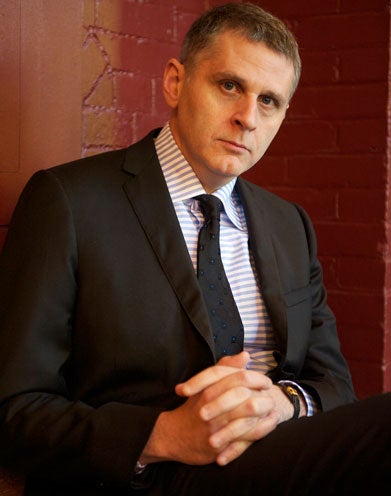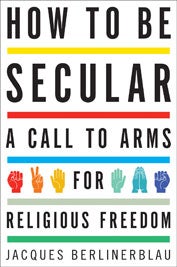Title: Secularism Necessary for Religious Freedom, Professor Says
Jacques Berlinerblau says secularism is “the most misunderstood and mangled ‘ism’ in the American political lexicon.”

Jacques Berlinerblau
December 5, 2012 – Jacques Berlinerblau says secularism is “the most misunderstood and mangled ‘ism’ in the American political lexicon.”
Berlinerblau, director of the Program for Jewish Civilization in the School of Foreign Service argues in his recently published book that secularism is “a political philosophy that is predicated on a suspicion of any and all ties between government and religion.”
He says this translates into suspicion about various government strategies, all of which aim to balance a citizen’s need for freedom of religion with a state’s need to maintain order.
“When secularism achieves that balance – and sometimes it fails disastrously – it performs a public service that should always evoke awe,” Berlinerblau writes in How to Be Secular: A Call to Arms for Religious Freedom (Houghton Mifflin Harcourt, 2012).
Woozy and Concussed
The associate professor says his definition of secularism does not in any way reject or denigrate religion, but rather stresses a core secular goal of “enabling citizens to live peaceably with other citizens whose creed is different than their own.”
But secularism is losing ground in America, he says.
“There’s a brain drain among secular leaders and intellectuals,” Berlinerblau says. “Many have been slow to adapt to the radically shifting legal climate. That would be a climate in which separation of church and state is no longer the pet policy of the United States Supreme Court.”
“They’re fighting and losing legal battles because the court has abandoned its fealty to mid-century separationism,” he adds.
Secularism in America is “woozy and concussed” he says, partly because the Christian right has successfully equated it with things like godlessness and moral turpitude.
Politics and Faith

While conservatives imply that secularism is a massive political force, Berlinerblau notes that, “it was always a small, and often fragmented, movement,” adding that the “wall of separation,” erected between the 1940s and 1970s lacked widespread popular support.
Both Democrats and Republicans are guilty of eroding this separation, the professor says.
Berlinerblau also notes that under his definition, religious minorities are natural secularists. Catholics in particular, fearing a Protestant establishment of religion, tend to embrace secularism, as do Jews, Buddhists, Sikhs, Muslims and others.
Sequencing a Genome
The author of The Secular Bible: Why Non-Believers Should Take Religion Seriously (Cambridge University Press, 2005) and Thumpin’ It: the Use of the Bible in Today’s Presidential Politics (Westminster John Knox, 2008), Berlinerblau says he wrote his latest book to “sequence the genome of American secularism.”
“The conundrum is that no one really agrees as to what secularism is and surprisingly little research has been conducted on the topic,” he says. “So everyone uses the term, but its definition remains vague. One of my conclusions is, if there’s ever going to be a coherent secular movement in the United States, there will have to be clear articulation of its core values and principles.”
Sober Task
He offers a “12-step” program to revive secularism that includes not forgetting Catholics.
“Either secularism and Catholicism, whose relations have often been strained, must have this peace pipe moment or secularism in America isn’t going to go very far,” he says.
He also advises promoting a clear mission for secularists and understanding the value of coalitions.
“What lies ahead is not a future of boldly expanding the vision of the architects of secularism,” Berlinerblau writes in the book. “Rather, the sober task at hand is one of consolidation – a firm and dignified defense of the imperiled secular virtues of moderation, toleration, and self-criticism as well as the political conditions that make those virtues possible.”